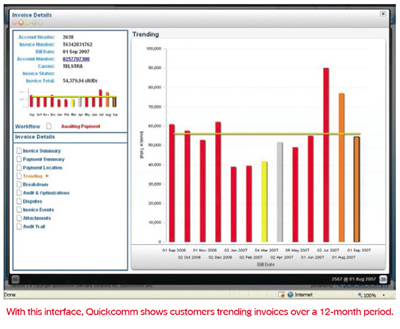|
November 2009 | Volume 12 / Number 11
Feature Story
Service Providers Take TEM in New DirectionsBy: Paula Bernier (News - Alert)
Telecom expense management is set to become a growing force in telcos’ business service portfolios as companies like PAETEC and Verizon (News - Alert) Business move to assist customers in managing their costs around everything from wireline and wireless connectivity services to energy consumption. Getting Charged UpWhile TEM traditionally has been an area addressed by specialty software houses, competitive service provider PAETEC (News - Alert) moved into the fold back in 2000 with the acquisition of Pinnacle Software. The service provider became interested in the area of accounting because it permeated so many aspects of its business and its customers’ interests, including call management, CDRs, facilities management, trouble ticketing, help desk and PBX interconnection. At the time of the deal, says PAETEC President and CEO Arunas Chesonis (News - Alert), most people had multiple Excel spreadsheets and databases into which they were making duplicative entries. They needed one platform and one database that fed everything, he says, so that’s what PAETEC developed, based on the Pinnacle Software solution. Today PAETEC’s Pinnacle Software offer, an Oracle (News - Alert)-based solution, is used by about 300 customers. It enables businesses see whether they’re being charged appropriately per invoice, whether they should be disputing something, and more, says Chesonis, adding the solution is like ERP for the IT set. Businesses can buy the Pinnacle software and run it in their data centers. They can elect to have PAETEC host the software. Or PAETEC can both host the software and handle invoicing for the customer. “The fastest-selling part of the [Pinnacle] product today is TEM, and it’s managing not just the wireline bills, but the wireless bills,” says Chesonis, adding that the solution helped one state catch $800,000 in miscalculations. “TEM is part of the whole lifecycle management,” he adds. Chesonis, who in a keynote speech at ITEXPO (News - Alert) West 2009 in September revealed PAETEC’s plans to expand into the energy vertical, says TEM also will be an important solution powering the company’s initiatives in this space.
Verizon Managed Mobility Solutions will help companies improve mobility programs by addressing five key areas. Enterprises can subscribe to one or more of the following modules. Inventory and Expense Management
Logistics
Mobile Device Management
Mobile Security
Application Management
TEM for a Global SolutionMeanwhile, Verizon has made some significant moves in the TEM space recently as part of its Managed Mobility Solutions effort. The carrier in September announced it had tapped Quickcomm Software Solutions and Sybase (News - Alert) to help it deliver integrated inventory and expense management, and device logistics as part of the above-mentioned offering. Managed Mobility Solutions helps enterprise customers manage mobile devices, usage plans and applications, across multiple carriers. “We live in a 24/7 world and organizations of all sizes struggle with managing a mobile workforce,” says Nancy Gofus, senior vice president of global business products at Verizon. “By working with Quickcomm, our Managed Mobility Solutions enable enterprise organizations to meet the demands of their growing workforces – across the globe.” Louis Crespo, senior vice president of global business development at Quickcomm, illustrates how the Verizon Business (News - Alert) Managed Mobility Solutions offer works. He says the solution can help companies who are struggling to manage their mobile costs and inventory (the number of employer-provided mobile devices used by staff). Verizon Business does that by taking all of the organization’s mobile service charges – be they from Verizon or any other mobile service provider – and consolidates them. As part of the service Verizon also can run those charges through the organization’s systems as needed (for example, through an HR system to match billing information with employees or departments). “At the end of the day Verizon Business is loading the bills [and] managing the expense side,” says Crespo. Additionally, Verizon offers customers with a portal that their employees can visit to peruse and order new mobile devices. The portal provides employees with a catalog of devices available to individuals at their level of the organization; employees can place orders for the devices of their choice of the options provided; once selections are approved by the organization, Verizon Business handles the fulfillment and ensures employees receive not only the devices they ordered, but also any related instructions and peripherals. “The end result is the customers’ end users get their phones on their desks completely going through a Verizon service for all requirements and fulfillment,” Crespo says. There’s another cool aspect to this service in its logistics component, adds Crespo. Employees get software and security profiles automatically loaded to their mobile devices as needed. “If there is a new security update that needs to happen for 5,000 Treos of BlackBerries that are out there, the customer will go to Verizon and say ‘Hey, I have a fix that needs to be broadcast out,’” Crespo says. Mobile devices also can be remotely controlled in particular situations as part of the Verizon service, he says. For example, if the organization’s CFO leaves her BlackBerry (News - Alert) in a taxi, Verizon Business can do a remote wipe or remote security lock on that device to ensure no outside party has access to the proprietary company information that might be on it.
Credit Card Services Are Ripe for CompetitionBy Paula Bernier Eighty-five percent of the small business market is still using analog technology for point-of-sale applications, and this presents a significant opportunity for competitive service providers, says Charles Wu, head of IP Pay, a division of Convergence (News - Alert) Technologies Inc., which wholesales credit card services.
About IP PayIP Pay sells the IP Pay Account Updater, which ensures uninterrupted recurring payments by seamlessly updating “card on file” account information without impacting cardholders. Cardholder account information changes occur for a variety of reasons, including card upgrades, bank portfolio conversions, card expirations, lost or stolen cards and account closures. The company’s Account Updater extends the life of recurring payment arrangements by helping secure ongoing, revenue-generating relationships, all while locking in revenue, reducing processing costs, maintaining service continuity and strengthening cardholder satisfaction. Competitive providers could come in and offer those customers the services and connectivity to help them move credit card applications onto IP-based connections, and they could offer other voice and data services as part of the deal, says Wu. “People are doing it,” says Wu. “The technology is there. It’s more of a mindset change, and it’s more of a fundamental business process change” that will be required for this movement to go mainstream. “To a small business, they love to save $30 on their voice. But if they can’t process payments, they’re out of business,” Wu adds. “So you’ll still find gas stations and convenience stores that have dedicated phone lines for each credit card machine.” And a supermarket with five registers may have five phone lines, he says. Some companies address these customers by running ATAs and emulating a dial line, he adds. But he says that’s a problem because then the credit card information is traversing the connection unencrypted. It’s also less than ideal because dial-up transactions for this application typically take 10 to 15 seconds, whereas similar IP-based transactions average just two to three seconds, which is a significant difference for both businesses and their customers. “If you look at the world of payment, it reminds us of the world of Internet [when] Internet was mostly dial-based and broadband was just coming along,” says Wu. IT New DriversThe explosion of mobile services and usage is leading corporations to look for outsourced solutions such as the one offered by Verizon Business, Globalcomm’s Crespo says. In the past mobile was about 5 percent of the telecom spend for corporations, he says; today, it’s typically between 30 to 45 percent. And often it’s even more for organizations in Europe. According to IT research firm Forrester (News - Alert), 73 percent of the global enterprise workforce will be mobile users by 2012. That means the 187.9 million mobile users in 2008 will expand to 397.1 million users in 2012.
Verizon is the first mobile player to get into this space doing more than just outsourced billing, according to Crespo. But in light of the expansion of mobile use in the enterprise space, more service providers are starting to pay attention to this opportunity, he says. And that’s not just in the U.S., but worldwide. “Customers are now having more options from an international perspective,” says Crespo. TEM was born in the U.S and there are lots of telecom expense management providers here, he says. However, choices for TEM are “thin” in Asia and the Middle East, he says, but things are beginning to mature from an international TEM perspective. IT Today @ TMC
Headlines
Upcoming Events
MSPWorld
The World's Premier Managed Services and Cloud Computing Event Click for Dates and Locations Corporate News
|
|





 ”Managed mobility services are an increasingly critical offering in the enterprise mobility space,” says Stephen Drake, program vice president for mobility and telecom research at IDC (
”Managed mobility services are an increasingly critical offering in the enterprise mobility space,” says Stephen Drake, program vice president for mobility and telecom research at IDC (
